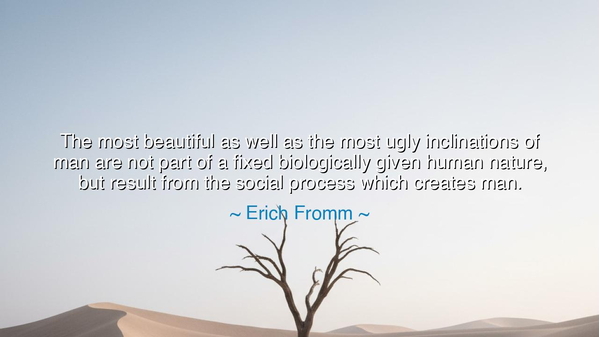
The most beautiful as well as the most ugly inclinations of man
The most beautiful as well as the most ugly inclinations of man are not part of a fixed biologically given human nature, but result from the social process which creates man.






The great psychoanalyst and humanist philosopher Erich Fromm once declared: “The most beautiful as well as the most ugly inclinations of man are not part of a fixed biologically given human nature, but result from the social process which creates man.” In this statement lies a profound challenge to those who believe that man is bound forever by instinct alone. Fromm insists that our nobility and our corruption are not etched immutably in our blood, but are shaped by the societies, the cultures, and the relationships that form us. Man is not merely born—he is created by the world he inhabits.
The meaning is clear: human nature is not a prison. We are not destined solely by biology to be selfish, violent, or cruel, nor are we guaranteed to be loving, compassionate, or just. Instead, our inclinations—the impulses that lead to beauty or ugliness—are cultivated by the soil of society. Just as a tree bends toward the sun or withers in the shade, so man’s heart grows noble in a society of justice and love, or deformed in a world of oppression and fear. The social process, then, is both a blessing and a danger, for it holds within it the power to elevate man toward his highest or to drag him into his lowest.
History offers us vivid examples. In times of war, ordinary men have committed unspeakable cruelties, not because their biology demanded it, but because society normalized hatred, violence, and obedience. Consider the horrors of the Nazi regime, where otherwise ordinary citizens became instruments of destruction, shaped by propaganda and fear. Yet in the same dark hour, others—like the White Rose movement or those who sheltered the persecuted—revealed the most beautiful inclinations of man, courage, compassion, and sacrifice. Both ugliness and beauty arose not from different species of men, but from the social process that molded them.
Fromm’s insight carries a deeply hopeful truth: if our worst inclinations are not fixed, then neither are our best. This means society has the power—and the responsibility—to cultivate what is noble. Through education that awakens conscience, through communities that value empathy, through cultures that honor truth rather than lies, we can create human beings who incline toward compassion, justice, and creativity. In this sense, every society is a workshop of humanity, and every generation is both the product of the last and the shaper of the next.
The teaching is also a warning: no one may hide behind the excuse of “human nature” to justify cruelty or despair. To say that greed, war, or hatred are inevitable is to deny our freedom and responsibility. Fromm reminds us that man is not finished at birth; he is shaped by the choices of his people, his leaders, his culture. If ugliness abounds, it is not destiny but failure. If beauty is rare, it is not accident but neglect. The mirror is turned back upon us all: what kind of man is our society creating?
Therefore, the lesson is plain: we must each take part in the social process of creation. We do this first in our homes, where children learn love or indifference. We do it in our schools, where young minds are awakened or dulled. We do it in our public life, where we either build communities of justice or tolerate systems of corruption. Every word we speak, every example we give, every structure we uphold contributes to the shaping of mankind itself.
Practically, let us choose to cultivate the beautiful inclinations. Encourage kindness when cynicism is easier. Honor truth when lies are convenient. Build communities where cooperation triumphs over competition, and where art and thought are given space to flourish. For if, as Fromm teaches, man is not fixed by biology, then the task of his becoming rests in our hands.
Thus, his words ring with both urgency and hope. The most beautiful and the most ugly are not destinies we inherit, but destinies we forge. If we would see a better world, we must create better men; and if we would create better men, we must build a better society. And in this work, every act of justice, every seed of compassion, every word of truth becomes not small, but monumental—for it is nothing less than the shaping of humanity itself.






AAdministratorAdministrator
Welcome, honored guests. Please leave a comment, we will respond soon